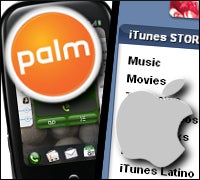 |
Palm filed a complaint with a trade group over Apple’s efforts to block the Palm Pre from syncing directly with iTunes software in a move that could force a third-party to resolve the matter.
In its complaint to the USB Implementers Forum (USB-IF), the industry group that oversees the ubiquitous Universal Signal Bus technology, Palm (NASDAQ: PALM) said Apple (NASDAQ: AAPL) is unfairly thwarting trade and abusing the USB standard
“Over the years, those that have implemented the USB standard have clearly benefited from the interoperability and competition among devices fostered by the standard … however, benefits such as these will be short-lived if member companies turn to using USB protocols for other than their intended purpose,” Kevin Morishige, senior director for Palm’s product technologies, wrote in the company’s complaint to the USB-IF. “Unfortunately, Apple has done just that.”
“This exclusionary use is not contemplated by the USB standard, which is clearly intended to facilitate interoperability between USB devices, not to regulate the content that flows between them,” he wrote. “Moreover, it is inconsistent with the letter and spirit of the USB-IF Membership Agreement, including the Antitrust Guidelines.”
Apple did not return requests for comment by press time, while spokespeople from Palm and the USB-IF declined to comment.
By filing the complaint with the non-profit standards group, it appears Palm is trying to draw the industry into taking its side in the escalating tug-of-war with Apple over the Pre’s iTunes syncing feature.
At issue is the Palm Pre’s ability to act like an iPod and work seamlessly with iTunes software, considered a key draw when the Pre launched June 6.
Shortly after, Apple responded by upgrading iTunes software to block the sync function. In late July, Palm released a minor upgrade to the webOS SDK that restored it.
The cat-and-mouse game is all happening as Palm tries to make a comeback in the smartphone sector under the leadership of new CEO Jon Rubenstein, an Apple veteran who played a key role in the development of the iPod.
Syncing with iTunes by third parties isn’t unprecedented, but Palm’s approach differs from traditional tactics, which is why controversy erupted over the feature. BlackBerry maker Research In Motion (NASDAQ: RIMM), for instance, offers its own software that reads the iTunes library files and syncs to its devices.
The Palm Pre, however, identifies itself to a computer as an iPod and syncs with iTunes directly, rather than through third-party software.
The USB forum complaint is not the only issue facing Apple — and on the face of it, not the most serious. The FCC looking into Apple’s rejection of the Google Voice application for the iPhone as well as the removal of related third-party software from its App Store.
Also, the FTC said it would continue to investigate the relationship between the Apple and Google boards, even though Google CEO Eric Schmidt announced he was resigning from Apple’s board on Monday.
Senators and the FCC are also examining the role of exclusive carrier deals, such as the one Apple currently has with AT&T to sell the iPhone.


